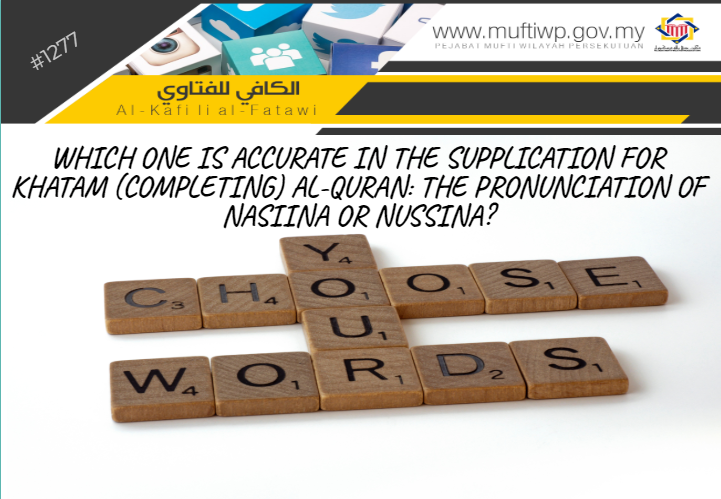Question:
Assalamualaikum SS Mufti. I have a question. Is it true that in the supplication for khatam al-Quran (completing the recitation of the whole Quran), the word Nasiina (نَسِينَا) supposedly read with nussina (نُسِّينَا)? Or is it okay to pronounce either recitation?
Answer:
Alhamdulillah, praise and thanks to Allah for the countless blessings He has blessed us all with. Blessings and salutations to the Prophet Muhammad PBUH, his wives, his family, companions and all those that follow his teachings to the day of judgement.
For the introduction, we first state the supplication meant:
الّلَهُمَ ارْحَمْنَا بِالْقُرْآن، واجْعَلْهُ لَنَا إمَامَاً وَنُوْرَاً وَهُدَىً ورحمةً الّلَهُمَ ذَكِّرْنَا مِنْهُ مَا نسيْنَا، وَعَلِّمْنَا مِنْهُ مَا جَهِلْنَا وَارْزُقْنَا تِلَاوَتَهُ آنَاءَ اللَّيْلِ وَأطْرَافَ الْنَهَار واجْعَلهُ لَنَا حُجَّةٌ يَا ربَّ الْعَالَمِيْن
“O Allah! Bless us with the Quran, and make it our imam, light, guidance and mercy upon us. O Allah! Make us remember from its verses what we had forgotten, and teach us from its verses what we have no knowledge upon, bless us with the strength to read it days and nights, and make it as the hujjah for us, O Lord of the universe.”
This du’a is not found in any narrations of the Prophet PBUH as the supplication when one completes the recitation of the Quran. Nevertheless, based on its meaning, this du’a is a good supplication. Hence, the practice of supplicating with this du’a is permissible based on the concept of the general commandment to supplicate.
In fact, among the times when our du’a is mustajab (granted) is after one completed the recitation of the whole Quran. This is considered as a form of tawassul (supplicating to Allah through the intermediary of our good deeds). Tsabit bin Qais RA said:
كَانَ أَنَسٌ إِذَا خَتَمَ الْقُرْآنَ جَمَعَ وَلَدَهُ وَأَهَلَ بَيْتِهِ فَدَعَا لَهُمْ
“Anas when he finishes reading the whole book of the Quran, he gathers his children and his family members in his house then supplicates for them.”
Riwayat al-Darimi (3801)
Imam al-Nawawi after stating numerous narrations on the virtues of supplicating after one finishes reading the whole book of the Quran said: “And it is highly acclaimed (by syarak), the action of supplicating after one finishes reading the whole book of the Quran as we mentioned before.”
Speaking of the issue pertaining the phrase نَسِينَا and نُسِّينَا, we state here that according to the lexical theory of the Arabic word, the phrase نَسِيتُ (I forgot) is the action of someone who says that, in which he indicates that he himself did the action. While the phrase أُنسِيتُ is a verb of others, in which he is made forgotten by others.
Referring back to the question asked, there is a narration of Abdullah bin Mas’ud RA where the Prophet PBUH said:
بِئْسَمَا لأَحَدِهِمْ يَقُولُ نَسِيتُ آيَةَ كَيْتَ وَكَيْتَ بَلْ هُوَ نُسِّيَ اسْتَذْكِرُوا الْقُرْآنَ فَلَهُوَ أَشَدُّ تَفَصِّيًا مِنْ صُدُورِ الرِّجَالِ مِنَ النَّعَمِ بِعُقُلِهَا
“What a wretched person is he amongst them who says: I have forgotten such and such a verse. (He should instead of using this expression say): I have been made to forget it. Try to remember the Qur'an for it is more apt to escape from men's minds than a hobbled camel.”
Sahih Muslim (790)
Imam al-Nawawi Rahimahullah place this hadith under the chapter:
الأَمْرِ بِتَعَهُّدِ الْقُرْآنِ وَكَرَاهَةِ قَوْلِ نَسِيتُ آيَةَ كَذَا وَجَوَازِ قَوْلِ أُنْسِيتُهَا
The commandment of preserving (the memorization of) the Quran and makruh (undesirable) to say “I forgot certain verses” and the permissibility to say “I am made forgotten of certain verses.”
In fact, Imam al-Nawawi upon commenting on this hadith said: “Upon this hadith is the makruh ruling to say ‘I forgot certain verses’ and it is makruh tanzih. And indeed, it is not makruh to say ‘I am made forgotten’. This is because what is prohibited is the saying of ‘I forget’ because it contains the act of tasahul (inattentiveness) and neglect towards the Quran”. Refer Al-Minhaj Syarah Sahih Muslim, Al-Nawawi (6/404).
Conclusion
As a conclusion, we state here that the most accurate supplication is by stating:
الّلَهُمَ ذَكِّرْنَا مِنْهُ مَا نُسِّيْنَا
“O Allah! Make us remember from the verses which we are made forgotten,”
This is in accordance with those judgements we presented above. While, it is better to avoid using nasiina because the word نَسِيْنَا means ‘we have forgotten’ which contains negative connotation that portrays our abandonment and neglect towards al-Quran al-Karim, and it is ruled as makruh according to the scholars.
Lastly, we pray to Allah SWT to bless us the correct understanding for us to practice the religion. Ameen.


